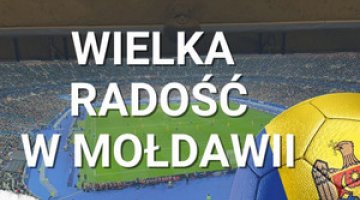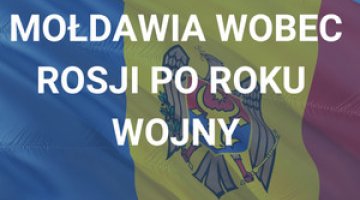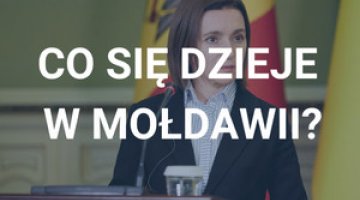Escalation of anti-government feeling in Moldova
On 7 June, an anti-government demonstration in Chisinau organised by the pro-European Civic Platform ‘Dignity and Truth’ took place. Between ten and fifteen thousand demonstrators demanded punishment of those guilty of removing about $1 billion from the Moldovan banking system before the end of 2014, as well as the resignation of the government officials responsible for it, including leaders of the ruling coalition. The demonstrators announced that if their demands are not met by 27 August (Moldova’s Independence Day), they will carry out a much more numerous and long-lasting protest in the main square of the capital.
The unexpected escalation of social tensions testifies to the discreditation of the ruling coalition, whose leaders – despite being in power for more than five years – have not only proved unable to solve the country’s most important problems, but have also effectively taken over the apparatus of the state, and used it to protect its own political and business interests and to reap financial benefits. Along with the Moldovan public’s disappointment at the pro-European government, support for integration with the EU has now reached a historical low (32%). The prospects for new pro-European parties are vague, while the popularity of pro-Russian groups is steadily increasing, and they are most likely to gain a majority of votes during the local elections to be held on 14 June.
A new social movement
‘Dignity and Truth’ is an informal pro-European initiative, not linked to any political party, which was set up this February by well-known Moldovan social activists, journalists and lawyers. It has no clear leader or structures. Its main slogans include calls for the resignation of those responsible for the bank scandal, including the leaders of the ruling coalition: Vlad Filat, chairman of the Liberal Democratic Party (PLDM); Vlad Plahotniuc, a billionaire and oligarch who has de facto control of the Democratic Party (PDM); and Vladimir Voronin, leader of the Communist Party (PCRM), which is formally outside the coalition, but supports the minority government.
The June demonstration was the third organised by the Platform over the past two months. The previous one on 3 May was, according to various estimates, attended by between twenty and fifty thousand participants, and thus constituted one of the largest demonstrations held in Moldova over the last six years.
The roots of the protests
The minority government formed in February 2015, which continues the pro-European coalition holding power since August 2009, has now recorded record-low levels of support. Even though its two constituent parties, the PLDM and PDM, still succeeded in winning a total of 42 seats (of the 101 seats in parliament) during parliamentary elections last November, the parties can now only count on 5.2% and 4.1% of votes respectively (with a 6-percent electoral threshold). This collapse in their support is a result of the voters’ growing frustration at the lack of action by a government which has not only proved unable to cope with the country’s essential problems, such as corruption and the economic crisis, but has also been regularly compromised by corruption scandals and internal conflicts. In recent years, the coalition’s two leading politicians, Filat and Plahotniuc, have subjugated state institutions to protect their own political and business interests.
The catalyst for the explosion of social discontent lay in two events. Firstly, reports emerged of the largest financial scandal in the country’s history, in which at the end of 2014 the Moldovan banking system had around US$1 billion (about 15% of the annual GDP of the country) removed from it, with the knowledge and probably with the participation of senior coalition politicians. As a result of this affair, there has been a serious fall in the already poor value of the Moldovan leu, and in order to save the situation the National Bank of Moldova has had to mobilise significant resources from its reserves.
The second event was the establishment of the PLDM and PDM minority coalition with the support of the Communists, who are reluctant to engage in integration with the EU, and are perceived as a pro-Russian party. This happened despite the fact that both before and after the elections, the leaders of both coalition parties had declared their willingness to appoint a majority cabinet with the pro-European Liberal Party (which had been a member of the government until March 2013). Meanwhile, a large part of the electorate had voted for the pro-European forces not because of any real sympathy for these groups, but to prevent the victory of pro-Russian parties (including the Communists).
The government’s reaction
The latest mass demonstrations have come as a huge surprise to the Moldovan government. Nevertheless, the coalition has taken fairly quick (although chaotic-seeming) steps to ease social tension. Firstly, attempts are being made to shift suspicion of involvement in the banking scandal away from the government. This was the reason behind the publication on 4 May (the day after the biggest demonstration so far) by Andrian Candu, speaker of the Moldovan parliament, of a secret audit of Moldova’s financial sector conducted by the US firm Kroll. The report clearly stated that Ilan Shor, a Moldovan/Russian entrepreneur and millionaire, was the main participant in the embezzlement. On 6 May Shor was officially accused of involvement in the banking scandal and placed under house arrest. Although Shor most likely was the chief architect of the largest financial crime in the country’s history, his detention should be considered primarily as an attempt to divert attention from the possible participation of Filat and Plahotniuc in the affair.
Secondly, it seems that the coalition is trying to sew fear among the public in order to facilitate the introduction of restrictions on the right to public protest against the government, under the pretext of guaranteeing security and preventing the destabilisation of the country. One element of this strategy seems to have been the police raids carried out on 27 May, during which officers found explosives, Molotov cocktails, ammunition, mobile phones with Russian SIM cards and other items at two locations in the capital, which could have been used to construct improvised explosive devices. According to the authorities, these materials could have been used to destabilise the situation in the country (for example, by terrorist acts), but the credibility of the police’s actions has been called into doubt among the public.
Thirdly, the government is trying to discredit the protest movement. According to reliable information, Plahotniuc has recently been giving unofficial financial support to unionist organisations (which favour the unification of Moldova and Romania) which have been actively participating in the anti-government protests. Their open presence at demonstrations has discouraged the representatives of national minorities (who traditionally are mainly against integration with Romania) from participating in the protests, as well as those ethnic Moldovans (representing the vast majority of the population) who are not interested in giving up independence in favour of unification with their western neighbour.
Outlook
It seems that the PLDM and PDM will not be able to regain the lost trust of the Moldovan public in the foreseeable future. As a result, from the perspective of a large part of the pro-European electorate, there is currently no political force which would be able to gain their support, as is reflected by the very high number (over 32%) of people who are undecided or unwilling to participate in the elections. A certain part of this electorate will admittedly be courted by the European People's Party, formed this March by Iurie Leanca, a former Prime Minister who recently quit the PLDM, which is intended to be an alternative to the coalition groups; but its popularity is limited as the former prime minister is seen by many voters as being linked to Vlad Plahotniuc, and as such, as sharing responsibility for the banking scandal (which occurred on his watch). However, it is possible that in the coming months, the current protest movement will give birth to a new political force, unconnected with the current establishment, which will be able to enlist the support of pro-European voters.
It is almost certain that the current coalition, as well as the communists who have been supporting them, will be defeated in the local elections, while a significant portion of local government will be won by pro-Russian groups such as the Party of Socialists under Igor Dodon (currently running at around 17%) and Patria, led by Renato Usatîi (around 9%). There is no doubt that these groupings will exploit their electoral success to call for early parliamentary elections. However, these seem unlikely in the near future, because the coalition and the communists – aware of their low support – will try at all costs to maintain a stable parliamentary majority.
In the near future we can expect to see attempts to improve the government’s image, and perhaps even changes both within individual government institutions and ministries, as well as at the head of government. Also likely are a reshuffle of the coalition and the inclusion of the pro-European Liberal Party. However, these changes will be just for show, because the real control of the government and the state apparatus will continue to be exercised by Filat and Plahotniuc, neither of whom formally occupy any state posts. Also, it is unlikely that the key demands of ‘Dignity and Truth’ – especially the removal of the current coalition’s leaders from power – will be met, and so further social protests may be expected.




